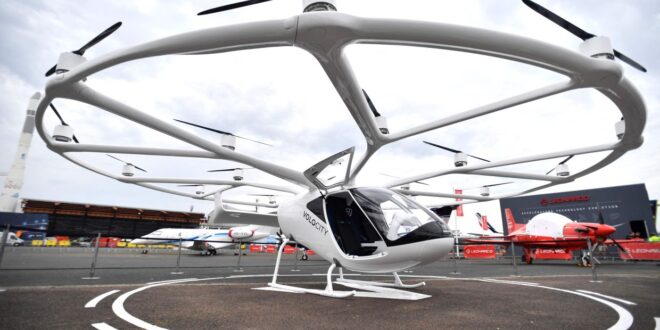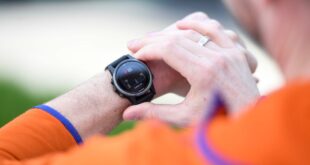Volocopter GmbH’s plan to whisk Olympics attendees across Paris in air taxis this summer faces steepening odds as time runs short to secure regulatory approval and key components for the battery-powered craft.
The VoloCity copter, which seats a pilot and one passenger, can still be ready for commercial service by the July 26 start of the Games, Chief Executive Officer Dirk Hoke said in an interview. But the challenge of bringing an all-new aircraft into service while meeting stringent safety requirements by then has become an increasingly uphill quest.
“Until the last moment when I get the stamp, anything can happen,” Hoke said in an interview in Paris. “We won’t know whether we fly with commercial operations” or just the pilot and possibly a non-paying guest.
The German air-taxi pioneer is working as quickly as it can to be ready, with daily discussions between Volocopter and the European Union Aviation Safety Agency, Hoke said. The company has also sent representatives to work with suppliers, who are making parts that also need to be approved for the first time.
The prospect of visitors whipping across Paris from venue to venue in the helicopter-like craft has added a futuristic buzz to the build-up ahead of the Games. Volocopter flew demonstrator flights with a predecessor aircraft at the Paris Air Show last year. But recent setbacks with competitors in the US and UK underscore the real-world challenges to the certification timelines set out by ambitious air-taxi startups.
A prototype operated by Vertical Aerospace Ltd. crashed in the UK last August, forcing the company to pause test flights until a new craft could be built. The company traced the failure to a bonding issue with the propeller.
In February, the US National Transportation Safety Board said in a report the 2022 crash of a Joby Aviation Inc. craft in California was likely caused by a propeller blade breaking off under stress testing.
Volocopter and EASA officials have been poring over the NTSB report on the Joby accident, Hoke said.
EASA has received some criticism over certification rules for eVTOLs, or electric vertical take-off and landing aircraft, that are so stringent they’ll make it “extremely hard” to bring air taxis to market, the CEO of Archer, another startup in the market, told the Financial Times last year.
Hoke, a former Airbus SE executive, said safety is paramount for Volocopter as well, and this has earned the company trust with EASA officials.
“They are super critical but on the other side also super constructive,” Hoke said of EASA. “For them, too, it’s the first time. They have to make sure that they don’t sacrifice safety at any moment.”
A spokeswoman for EASA referred questions to Volocopter when contacted by Bloomberg for comment.
The company is also working “intensively” with parts makers still contending with supply-chain kinks from the pandemic, Hoke said. This has meant shortages of electronic circuit boards and other components that led to engine delays.
New investors
A successful launch of passenger service in Paris would hand Volocopter an advantage over US rivals including Joby and Archer Aviation Inc. It would be timely too, as the company remains in talks with state-owned investment bank Bpifrance and other potential investors to raise more than €200mil (RM1bil) to help fund a second plant in France.
The air-taxi company is in contact with some European carmakers for possible investments, even though there are no ongoing negotiations, Hoke said.
Volocopter and airport operator Aeroports de Paris SA announced plans last year to fly five VoloCity craft at the games – guaranteeing the company a global audience for the debut of its futuristic flying machines.
Volocopter will aim for commercial services with the VoloCity craft during the Paralympic Games in late August – also being held in Paris – if it isn’t ready for by July, Hoke said. – Bloomberg
 BeritaKini.biz Berita Viral Terkini di Malaysia
BeritaKini.biz Berita Viral Terkini di Malaysia





